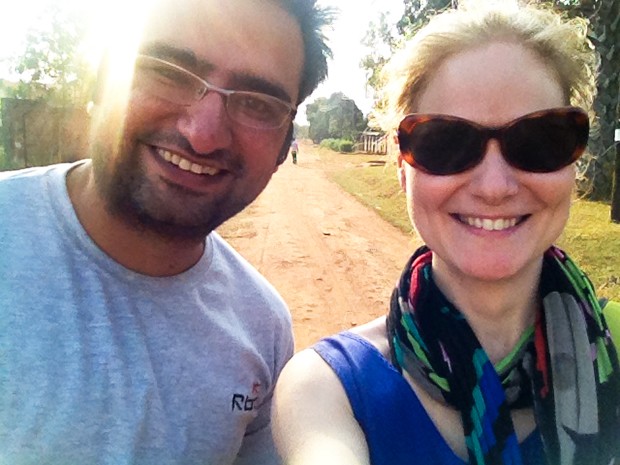Meet 2 JMSB students who are helping Ugandan businesses prosper
This past January, Tara Walker and Vinay Nawani, both MBA students at Concordia’s John Molson School of Business (JMSB), boarded a plane destined for Uganda.
While their objective was clear, they knew their job would be hard: over three and a half months, they planned to interview business owners in Gulu, a city in the country’s north, to assess the economic impact of the region’s unreliable energy system.
As walker explains, Gulu’s hydroelectric grid — run by a company called Umeme — is prone to outages.
“It’s the only source of publicly available power, and it’s inconsistent,” she says. “There are numerous blackouts and brownouts.”
If business owners wish to stay open during the frequent power failures, they must invest in gas-powered generators or even solar panels. Others rely on candles, while many close.
Walker and Nawani had hypothesized that, because of this, the cost of doing business in Gulu climbs significantly, ultimately leaving the consumer to shoulder the resulting price increases. They were largely correct, and they believe their data can offer solutions for Uganda and other countries facing similar infrastructure challenges.
“We’re trying to inform Uganda’s government, academics, business community and the hydroelectric company about the real impact of not investing more into the electrical grid,” Walker says.
The idea for the research came from Peter Odoch, chair of the Department of Economics at Gulu University. A business owner himself, Peter saw the effects of Gulu’s energy problem first-hand. He knew they could be quantified, but he couldn’t do it alone.
With the help of the Concordia Volunteer Abroad Program, which already had a presence in Gulu, and JMSB’s International Community Outreach Program, he sought out a graduate student from the university to assist him.
That student was Walker. Nawani came on board when a separate project he was set to undertake in Uganda fell through.
Upon arriving in Gulu, the pair hit the streets in search of businesses to survey. They spoke to 170 restaurateurs, bank managers, consultants, gas station owners, retailers, grain millers and more, asking them about everything from how they cope with the inconsistent supply of power to their revenues and expenditures.
Some questions proved more challenging than others.
“When it came to finances, they would often pull a number off the top of their head instead of looking into actual records,” Nawani says. “When we asked for exact figures, they would say they didn’t have them because they never maintained such information.”
Through this questioning the business owners, most of whom have no formal training, did gain a better understanding of the costs their enterprises incur.
“If they need to fuel a generator, they simply pay out of pocket,” Nawani says. “They weren’t really thinking about it, but when we calculated their monthly expenditures, they recognized they were spending a lot.”
In spite of those expenses, some businesses have actually benefited from the power failures simply by staying open when their competitors couldn’t. But, as Walker says, “they might have made out a little ahead, but this is not a sustainable strategy.”
She and Nawani also spoke with representatives from Umeme, the region’s power supplier. According to the company, the blackouts and brownouts stem from weather and, in some cases, citizens tampering with power lines to steal electricity.
“We asked them many questions about the allegations that they weren’t doing enough to ensure a steady supply of power, and they promised us there will be improvements in the coming years.”
Since arriving home in May, the two Concordia graduate students have been analyzing their data. They hope to turn their findings into a paper for publication.
Both were affected by their time in Uganda.
“We’re taught to believe that every business needs a resource base that includes a well-established infrastructure and a good knowledge of its industry, but I learned that a business can survive with very few resources,” Nawani says. “There just has to be a necessity for it.”
But the impact of his stay in Gulu transcends commercial concerns.
“It changed me as a human being.”
Supervisors for this project include Raymond Paquin from the Department of Management; Satoshi Ikeda from the Department of Sociology and Anthropology; Fariborz Haghighat from the Department of Building, Civil and Environmental Engineering; Peter Odoch Gulu University; and Moses Godfrey Owot from Gulu University.
Learn how East Africa is becoming a hotbed of tech.
